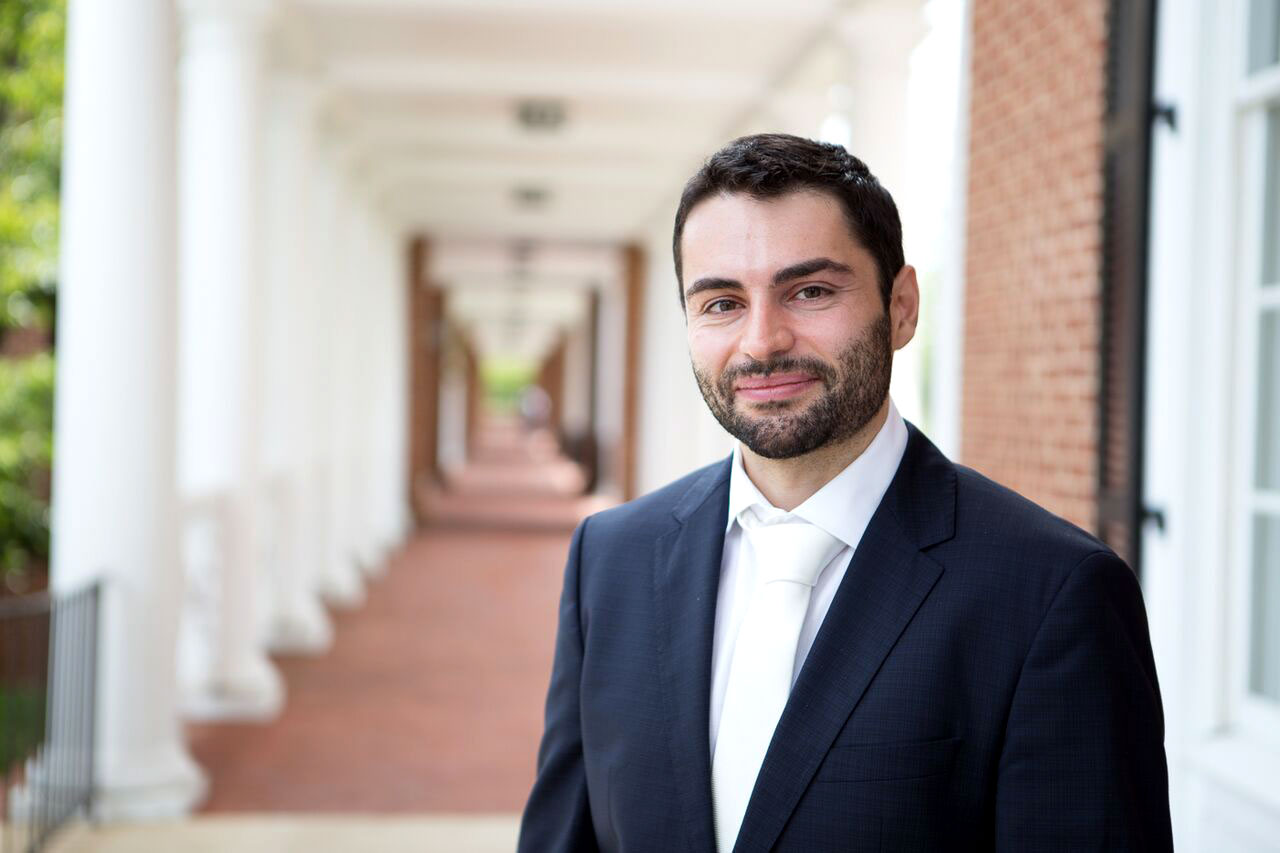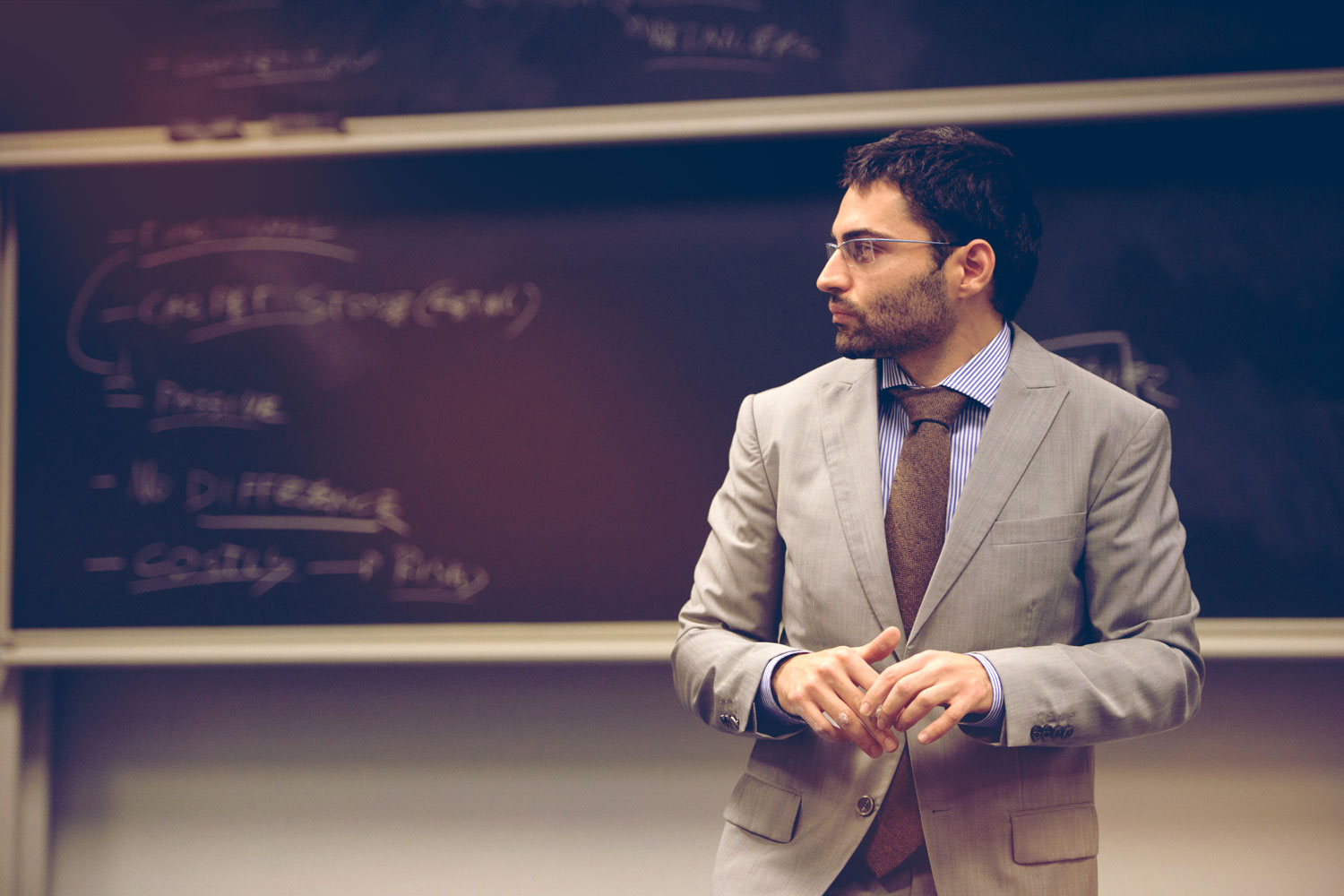Luca Cian, who joined the faculty of the University of Virginia’s Darden School of Business as a marketing professor last year, grew up in Cortina d’Ampezzo, an Italian ski town near Venice where university graduates, let alone two-time Ph.Ds., were a rarity.
“It is a small, beautiful town surrounded by UNESCO World Heritage mountains, very close to the border of Austria,” Cian said of his hometown, which has a population of about 6,000. “Most people work as tradesmen or artists, or work in the mountains as ski instructors or lumberjacks.”
Though neither of Cian’s parents attended a university, both encouraged him to think beyond the town’s borders.
“My parents were both a bit rebellious, from a slightly hippie generation,” Cian said. “Even though the culture in my town was very traditional, they were just a bit different, in a good way. I learned that there is nothing bad about having a different point of view.”
Cian excelled in high school and attended the University of Trieste as a first-generation college student, enjoying the same seaport town beloved by creative luminaries like James Joyce. His own creative streak led him to focus on advertising, pursuing bachelor’s and master’s degrees in marketing.

Luca Cian joined Darden as a marketing professor in last year, specializing in consumer behavior. (Contributed photos)
Though his ad designs won an award at the Cannes Lions International Festival of Creativity – associated with the Cannes Film Festival – Cian decided that he was more interested in what drove different consumers to make different decisions, an interest he also attributes to his parents.
“My mother and father are two absolutely loving people, but completely different. So growing up, I saw that everything could actually have two different interpretations,” he said with a laugh. “I have always been fascinated trying to understand not how things work, but why things work.”
He decided to pursue a Ph.D. in psychology from the University of Verona. His studies brought him to the United States after his dissertation advisers suggested reaching out to consumer behavior expert and University of Michigan professor Richard Bagozzi.
“I wrote him an email introducing myself, and fortunately he liked my idea and suggested that I come to Michigan for a few weeks,” Cian said. “Instead of being there two weeks, it became nearly a year.”
Cian completed his dissertation in Michigan and remained to pursue postdoctoral studies in marketing, taking all of the classes required of a marketing Ph.D. student. As a postdoc, he worked with professor Aradhna Krishna, head of the Sensory Marketing Lab at the University of Michigan. Krishna and her students study how physical perceptions like touch, smell and sound impact how consumers think and react.
After weighing several job offers, he decided to join Darden as the school’s first consumer behavior specialist, adding a new dimension to a marketing unit that has traditionally focused on quantitative analysis and strategy.
Darden’s extraordinary emphasis on teaching won him over. “Sometimes at research schools, they do not care quite as much about teaching, but at Darden, it is emphasized a lot,” Cian said. “Darden gave me the possibility of having all of the resources I wanted in terms of research, but also improving my teaching.”
Cian’s consumer behavior research has earned national media attention for practical insights tackling common business and social problems. For example, one widely reported study determined that making road signs more dynamic could improve driver reaction time and reduce car accidents.
“Humans are naturally attracted to objects that are moving,” Cian said. “During our study, we realized that if an image is static, but gives the impression of movement, it captures your sight earlier and your body automatically moves more quickly.”
A typical school crossing sign shows two stick figures in the road. Tweaking that sign slightly to show more dynamic images (e.g., two figures running instead of walking) improves reaction time, said Cian, who has one such sign in his office as a reminder of the study.
“We actually showed that, on average, reaction time improved by about 50 milliseconds, which, in a car going 60 miles per hour, is 4.4 feet of difference,” he said. “So even very subtle differences can have a huge impact and may prevent a lot of accidents.”
Another study examines metaphors for intellect, typically linked with elevation and emotion, typically linked with downward movement. For example, we say that we had a “high-level” intellectual conversation, but refer to romance as “falling in love.” Cian’s study found that consumers prefer advertisements that show intellectual concepts in the upper part of a screen and emotional concepts in the lower part.
“We grew up thinking that the brain is the abode of intelligence and the heart is the location of emotion,” Cian said. “This is clearly not the case, but if you look at cartoons and other images, emotion is placed in the heart and intellect in the brain. We understand rationality and emotion with this metaphor of up and down.”
At Darden, Cian is encouraging students to come to him with their own research ideas. This year, he is debuting a new psychology lab at the school, bringing in about 150 paid participants each month for a range of studies. In addition to computer stations, Cian has purchased an eye-tracking machine to pinpoint – down to microseconds – how participants’ eyes move across sample visuals and what they focus on. Eventually, he hopes to add additional tools monitoring participants’ eyes, skin and other biofeedback information.
“It is a new environment where students and faculty can do quick studies, test ideas and create a more experimental environment,” he said. “That is one of the things I liked about Darden, that they believe in creating this culture of research that is a bit more cutting-edge.”
Editor’s note: This is another installment in an occasional series profiling members of a generational wave of new faculty members at the University of Virginia.
Media Contact
Article Information
August 29, 2016
/content/why-we-buy-luca-cian-brings-psychology-insights-dardens-marketing-team


